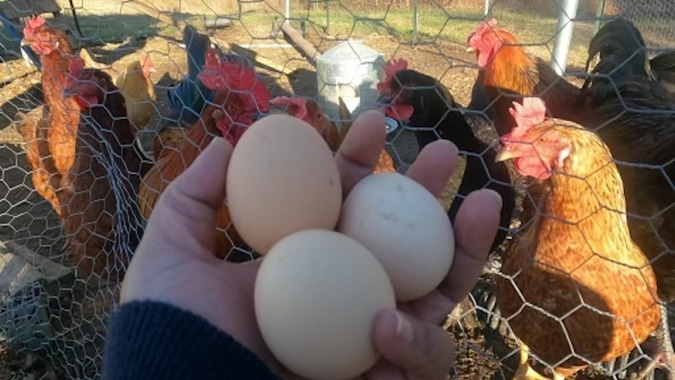There’s now a “basically” a waiting list for eggs from the Leaf and Bean Farm in Virginia, co-run by Nivek Anderson-Brown.

Courtesy Leaf and Bean Farm in Virginia.
“We have a list of regulars,” she tells Entrepreneur. “And a list of people trying to get eggs.”
Anderson-Brown is a homesteader, meaning that through things like growing herbs and tomatoes, she and her husband attempt to live a self-sufficient existence as far as food goes. (They also document their journey on TikTok).
They have 12 hens who each lay one egg a day, and sell the majority to friends and family for $6 a dozen. (About $2 less than at her local store by her account.) They typically sell to six families regularly, but now have six more on a waiting list of sorts.
Brown says inquiries for their eggs have doubled since egg prices dramatically shot up in stores. “There’s a lot more of, ‘Well listen if you get any extra…'”
The demand for eggs has reached acute levels as avian flu has culled flocks around the world. In the U.S., egg prices have gone up by 60 percent from December 2021 to December 2022, per the Consumer Price Index, and food prices overall in 2022 increased by 9.9 percent. This has driven interest in eggs from farms around the country, as well as looking into raising their own hens or pigs, Insider reported, citing local outlets.
Cidni, a homesteader in east Texas who did not share her exact location or last name for privacy reasons, told Entrepreneur that they’re starting to get a lot more questions about raising hens from, in particular, her husband’s coworkers in nearby Tyler, Texas.
“He is the one hearing, ‘Eggs are so expensive, I need to start raising, how do you do it?'” she said.
Cidni says that when someone has eggs in her homesteading groups, the comments and requests to buy them fly in. “They are just manic for eggs right now,” she says.
Cidni currently sells eggs from her flock to about a dozen nearby families. But after noting the price increases, discovering their preferred breed for laying, and getting more advertising among her husband’s new coworkers, they’re looking to add a host of birds to their flock.
Anderson-Brown said she still hears from people wondering if it’s cheaper or not to raise hens and produce your eggs. “They’re still missing the whole point,” she said. “You should be trying to be self-sustainable so things like this don’t affect your bottom line and how things like this are going to affect how you serve food to your family.”